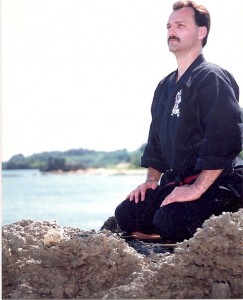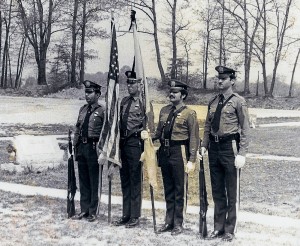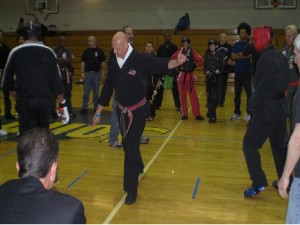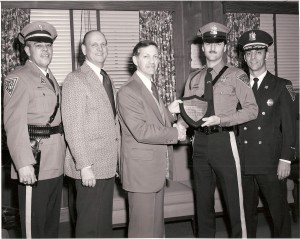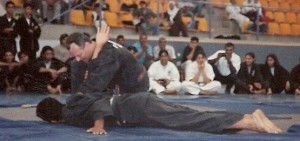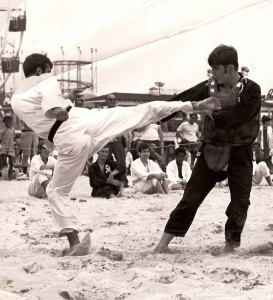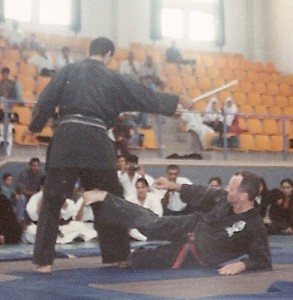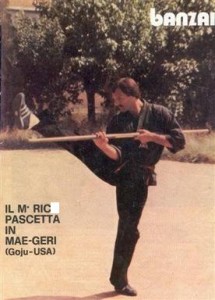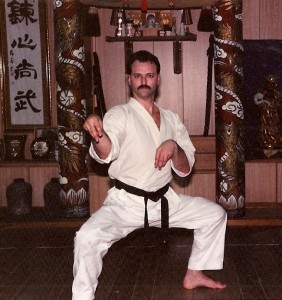“Secrets of the Masters” – Clear Vision
“The knife cuts but it cannot cut itself; the eye sees, but it cannot see itself.”
As our individual lives unfold we begin to amass a volume of knowledge. This is a combination of “Firsthand Knowledge” along with much “Secondhand Knowledge”. I personally define “firsthand knowledge” as information that we assimilate and process further through personal experience. This is the “been there, done that” type of information that weighs heavily on our overall concept of life.
In contrast, I define “secondhand knowledge” as information we glean from other sources. Those sources begin with our family (mother, father, siblings, etc.) and then friends, associates, and later, teachers/mentors (in a more formal way). Less direct sources may include written, audio, or video material. In my opinion, it is extremely important to accurately and critically identify the source of all secondhand knowledge when weighing its credibility.
When weighing the credibility of firsthand knowledge we each have a greater tendency to give this information automatic credibility. This may well occur because our perspective of life is established on the basis of what is seen through the lens of our own eyes, not through the eyes of others. It is critical to remember that the validity of the conclusions drawn from processing any information is a function of the original and underlying premise or premises. (more…)
Law Enforcement and Martial Arts – the “Best” Connection? – Part 2
This is PART 2 of a 3 part series titled: “Law Enforcement and Martial Arts – the ‘Best Connection’?” A new section adding to this article will be posted each Monday. (Please excuse the delay of this post due to technical difficulties)
Obstacles to “Best Practices” based training
After identifying some of the challenges for officers to even receive DT training beyond the academy basics, it becomes more significant that the initial training received is efficient, effective, and practical. There are number of obstacles that commonly stand in the way of accomplishing these simple requirements.
First, the “basic DT training” that exists in LE today varies significantly from academy to academy and sometimes even from instructor to instructor within a particular academy. It is only fair to acknowledge that there are some remarkably high quality LE/DT training programs in spite of many obstacles. This article is not intended as an indictment against the present status quo but as a fair discussion intended to inspire positive changes to benefit our LE professionals and help keep them safer. (more…)
“I got ripped off!!!….” – The Rest of the Story!
After many years with no contact I recently sent a few old photos to a martial arts friend, posting them on his social network page. They were of him in the ring, in a tournament organized by me, where he was in a match against one of my
Black Belt students. The photo was about 25 years old and to me it brought back memories of the ongoing sports rivalry that existed between those two excellent athletes when they were both much younger.
My friend responded graciously and we shared a brief chat online chat with some very positive interaction. It seemed like a breath of fresh air to interact with such an intelligent and accomplished individual.
I knew from other sources that he was quite accomplished in his professional life outside the martial arts. I also knew from observing him so many times in his youth that he was an extremely talented athlete with excellent skills and was a very spirited young man. It was even more encouraging to see that he had kept up with his regular and dedicated martial arts training and activities.
The following day I began receiving notifications from the social website of “comments” added to the photos I had sent. I was quite saddened and disappointed with what I read, by what had been written by him and some of his admirers. The comments were quite negative, quite involved, so I felt motivated to take the time here and address some very relevant issues that he had brought to light.
Law Enforcement and Martial Arts – the “Best” Connection? – Part 1
This is PART 1 of a 3 part series titled: “Law Enforcement and Martial Arts – the ‘Best Connection’?” A new section adding to this article will be posted each Monday.
Here are some relevant questions facing Law Enforcement officers, administrators, and trainers today concerning Defensive Tactics training:
Is there a “natural” fit between Law Enforcements (LE) and the Martial Arts (MA)?
What is the “best” Martial Arts system to learn for Law Enforcement?
Do our police agencies have the “Best of the Best” with regard for Defensive Tactics (DT) training for their personnel?
What are some realistic and practical expectations for improving the present LE/DT training?
Martial Arts “Masters” – FACT or FANTASY? – Part 6
This is “Part 6” and the final section in the series of articles titled “Martial Arts ‘Masters’ – FACT of FANTASY?”. I hope that this series has served to educate and stimulate. Please feel free to add your comments or your own personal conclusions either at the end of this post or on our “Comment” page.
MORE “REAL TIME” CONSIDERATIONS
In further considering the differences between “Full time” Masters and “Part time” Masters it is only fair to acknowledge that there are other factors that can also weigh in favor the credibility of the “Part timer”. Specifically, one pertinent and mitigating factor may well be the type of full time work that a particular Master does in addition to his “Part time” activity teaching Martial Arts.
There are examples of Part time Masters who’s “other” employment parallels and/or supplements their Martial Arts activity. Several examples where this may make a difference might include a full time career Law Enforcement Officer or a full time Career Soldier.
“Secrets of the Masters” – Seeking vs Finding
“….When someone is seeking it happens quite easily that he only sees the thing he is seeking; that he is unable to find anything;
unable to absorb anything because he is only thinking of the thing he is seeking, because he has a goal, because he is obsessed with his goal.
Seeking means: to have a goal; but finding means: to be free, to be receptive, to have no goal.”
-Siddhartha
In the above quote the famous philosopher, Siddartha, contrasts “seeking” with “finding” and seems to imply that in some manner the previous cancels the latter.
In my own life I have been inspired to make it a quest to “seek the truth”. Following the logic of Siddhartha, however, would (more…)
Martial Arts “Masters” – FACT or FANTASY? – Part 5
A new section to this article: “Martial Arts ‘Masters’ – FACT or FANTASY?” will be posted every Thursday. Please leave a comment giving your feedback, questions, and/or opinions. I look forward to the discussions.
QUALITATIVE EVALUATION
In the interest of fairness and realism we must also not assume that simply because an individual practitioner has opted to work full time as a Martial Arts instructor that this automatically legitimizes him/her as a legitimate “Master” teacher. If that were the case then any person who opted to open a full time business could erroneously call himself a “MA Master”. First we must look at how, when, where, and from whom he/she received his initial and original teaching credentials.
Martial Arts “Masters” – FACT or FANTASY? – Part 4
A new section to this article: “Martial Arts ‘Masters’ – FACT or FANTASY?” will be posted every Thursday. Please leave a comment giving your feedback and/or opinions. I look forward to the discussions.
QUESTIONABLE PRACTICES
Unfortunately, today there are those individuals who would take a loose interpretation of aforementioned requirements and claim that since they were the “founder” or “patriarch” of their own “system” that they are “Grand Master” or 10th Degree. The pertinent question is: “Grand Master” of what?
In today’s modern age there are those who have used this 10th Degree status under the proposition that they are “founders” of their own system. This is a seriously questionable practice. If it were an instant way to credibility then any individual with little or no training and experience could create a fantasy that he/she had ‘created’ his/her own unique system. My opinion is that, although they may or may not actually be in the process of attempting to create their own system, such a system and their “real” status would certainly lack much substantiated credibility as compared with those individuals whose work and efforts had stood the test of time and scrutiny of their peers. Age old wisdom dictates, “Let the buyer beware.” (more…)
MMA vs Tradition – Part 4
This is “Part 4” and final article in the series titled, “MMA vs Tradition”, examining the contrast between the recently popular Mixed Martial Arts (MMA) phenomenon and Traditional Martial Arts. I hope this series has been stimulating and enlightening. Please leave a comment giving your feedback, questions, or opinions. I look forward to continued discussions.
PERSONAL VALUES
And last, there is always the risk in any martial arts training that the “Master”, “trainer”, or “coach” will develop individuals with functional physical skills but without the value system that must rightly be followed if the practitioner is to “survive” in society after any potential physical confrontation. Remember that in a civilized society, there are legal and social repercussions after a physical confrontation.
Martial Arts “Masters” – FACT or FANTASY? – Part 3
A new section to this article: “Martial Arts ‘Masters’- FACT or FANTASY?” will be posted every Thursday. Please leave a comment giving your feedback and/or opinions. I look forward to the discussions.
Significance of Black Belt Levels
Standards for the higher degrees/levels of Black Belt have taken much longer to develop. Most established systems view the first three levels of Black Belt as levels where the student focuses on perfecting the physical technique and begins to better understand the relationship between the various aspects of the system. The student begins to better understand the principles governing those aspects along with pertinent tactics and strategies for application. It is significant to note that he must also gain greater experience in passing such knowledge and information along to students with less experience.
